初中英语译林版九年级下二单元Grammar
- 格式:docx
- 大小:52.01 KB
- 文档页数:7
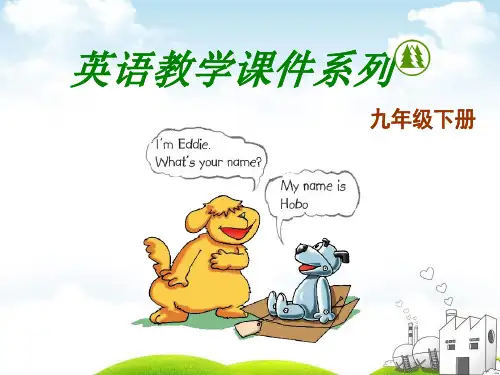
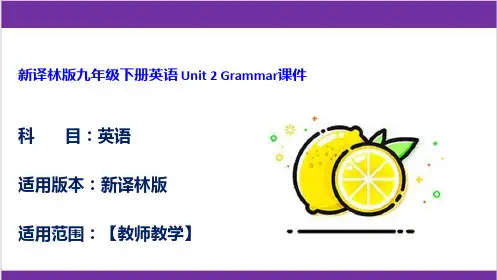
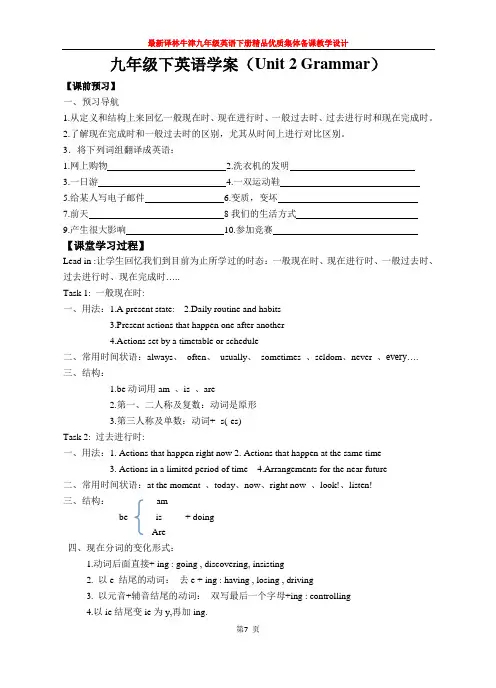
九年级下英语学案(Unit 2 Grammar)【课前预习】一、预习导航1.从定义和结构上来回忆一般现在时、现在进行时、一般过去时、过去进行时和现在完成时。
2.了解现在完成时和一般过去时的区别,尤其从时间上进行对比区别。
3.将下列词组翻译成英语:1.网上购物2.洗衣机的发明3.一日游4.一双运动鞋5.给某人写电子邮件6.变质,变坏7.前天8我们的生活方式9.产生很大影响10.参加竞赛【课堂学习过程】Lead in :让学生回忆我们到目前为止所学过的时态:一般现在时、现在进行时、一般过去时、过去进行时、现在完成时…..Task 1: 一般现在时:一、用法:1.A present state: 2.Daily routine and habits3.Present actions that happen one after another4.Actions set by a timetable or schedule二、常用时间状语:always、often、usually、sometimes 、seldom、never 、every….三、结构:1.be动词用am 、is 、are2.第一、二人称及复数:动词是原形3.第三人称及单数:动词+ -s(-es)Task 2: 过去进行时:一、用法:1. Actions that happen right now 2. Actions that happen at the same time3. Actions in a limited period of time4.Arrangements for the near future二、常用时间状语:at the moment 、today、now、right now 、look!、listen!三、结构:ambe is + doingAre四、现在分词的变化形式:1.动词后面直接+ ing : going , discovering, insisting2. 以e 结尾的动词:去e + ing : having , losing , driving3. 以元音+辅音结尾的动词:双写最后一个字母+ing : controlling4.以ie结尾变ie为y,再加ing.Task 3: 一般过去时一、用法: 1.Actions that happened in the past2.Actions that happened one after another in the past二、常用时间状语:yesterday 、…ago 、in 1999、the other day 、last….、just now 、theday before yesterday、in the past三、.动词过去式的变化规则:规则动词的过去式的变化规律:1. 一般动词直接+ ed : directed 、reported 、visited2.以e结尾的动词:lived、based、promised3.以辅音字母+y结尾:studied、flied、cried4. 以元音+辅音结尾:双写最后一个字母+ ed: stopped、preferred不规则动词的过去式的变化需要记忆am、is-was; are-were; do-did;become-became; win-won; feel-felt;build-builtTask 4: Past continuous一、用法:1.Actions that happened at the same time in the past2,。
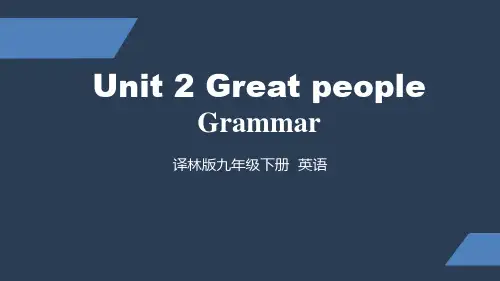
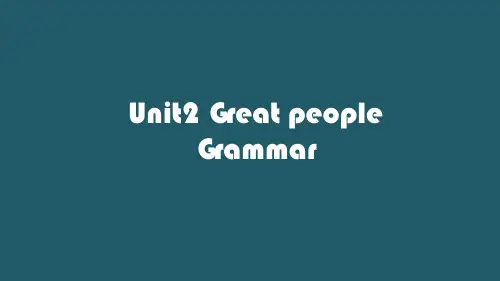
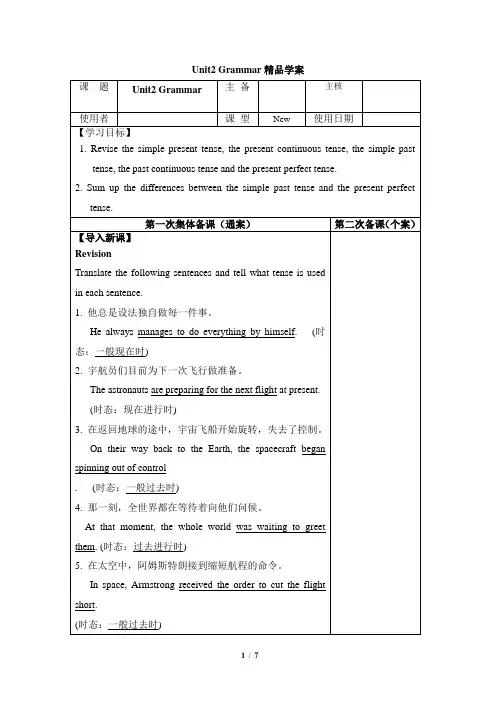
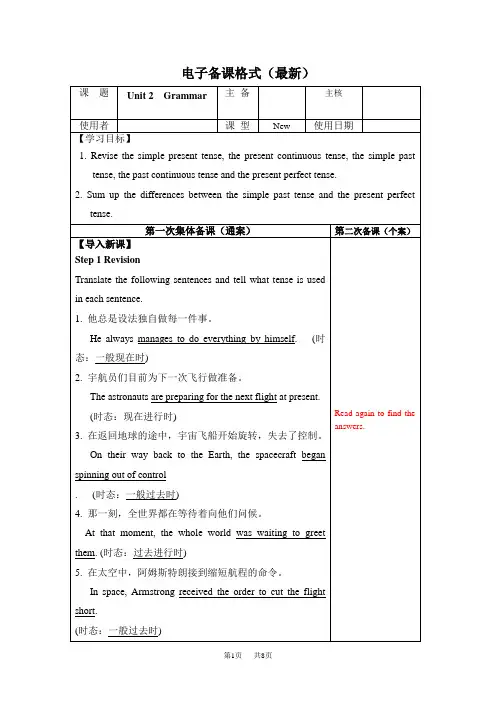
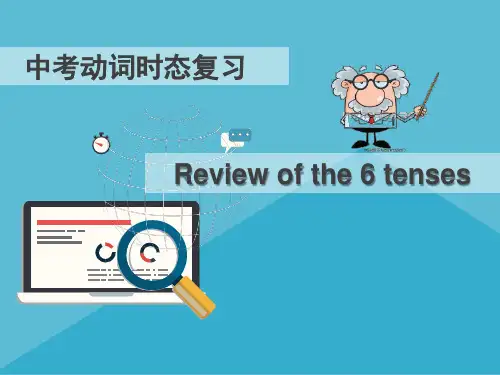
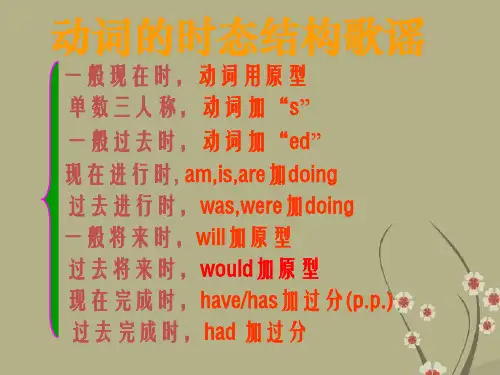
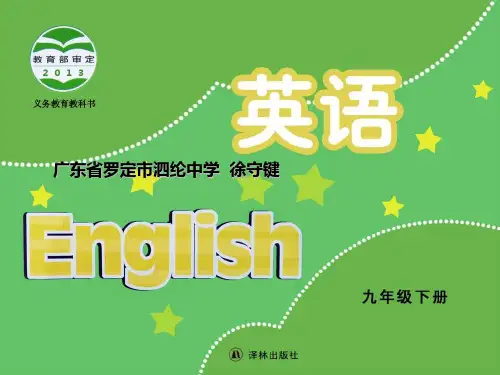
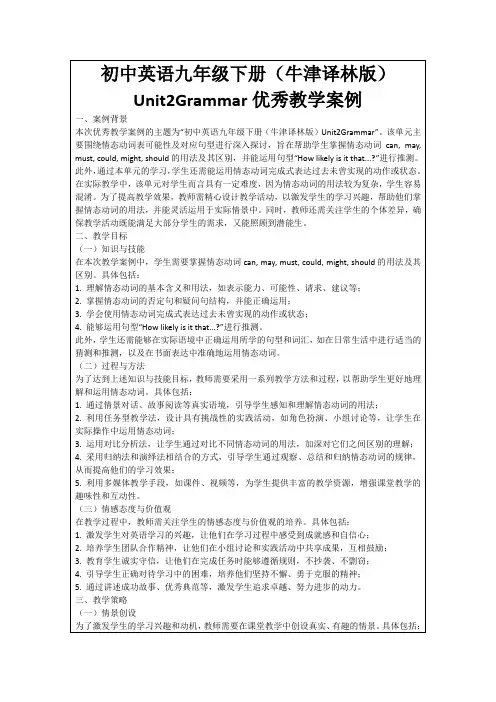
Unit 2 Grammar一、【课前导学】1. 章节_______________________________2. 离开去上海______________________3. 从事一项历史研究__________________4. 一双软底运动鞋____________________5. 上网查信息_________________________6. 给…写电子邮件___________________7. 打开电脑__________________________ 8. 练习弹钢琴_______________________9. 参加比赛___________________________ 10. 前天_____________________________11. 产生巨大影响12. 改变我们的生活方式13. 在古代___________________________ 14. 变质__________________________15. 手工洗衣服______________________ 16. 因为洗衣机的发明___________________二、仔细读P26表格,结合资料,总结一般现在时与现在进行时①概念不同一般现在时表示主语经常性习惯性的动作或存在的状态,也表示说话者的能力及自然现象;而现在进行时表示说话时(瞬间)正在进行的动作,也表示目前或现阶段一直进行的动作。
如:She often does her homework in the evening.她经常在晚上做家庭作业。
She is doing her homework now.她现在正在做家庭作业。
②构成方式不同一般现在时中谓语动词的构成有两种:be动词的一般现在时形式:am, is, are;行为动词一般现在时形式有动词原形或第三人称单数形式。
而现在进行时中谓语动词的构成是:am/is/are + doing③时间状语不同一般现在时的时间状语主要有:always, usually, often, sometimes, never, every day, on Mondays等,而现在进行时的时间状语主要有:now, these days, this week, at the moment等,有时句首有Look! Listen!或It’s+时刻等存在。
Unit 2 Great PeopleGrammarI. Teaching aims and learning objectivesBy the end of the lesson, students should be able to:1. understand the differences between the simple present tense and the present continuous tense, the simple past tense and the past continuous tense, the simple past tense and the present perfect tense;2. use the six tenses correctly.II. Teaching contentsNew words and phrases: passage, take part in, the invention of, by hand, in ancient timesIII. Focus of the lesson and predicted area of difficultyTo talk about how to learn about the world and the reasons in students’ own words.IV. Teaching proceduresStep 1 The simple present tense and the present continuous tense1. Game time: True or FalseT: Boys and girls. Do you know your classmates well? Now let’s play a guessing game. Describe yourself, and let your classmates judge true or false.【设计意图:以游戏方式自然导入时态的复习,激发学生参与课堂的积极性,让他们在真实的语境中运用一般现在时。
九年级英语Unit 2 Grammar译林版【本讲教育信息】一. 教学内容:9B Unit 2 Grammar二. 教学目标:1. 特殊疑问词引导的宾语从句2. 由祈使句转换成的宾语从句【具体教学过程】(一) 由that, if/ whether引导的宾语从句1. 连词that引导由陈述句充当的宾语从句,主句中常用的谓语动词有:think, believe, know, say, tell, understand。
He told us (that) he felt ill. 他对我们说他感到不舒服。
I know (that) he has returned. 我知道他已经回来了。
that 不省略的情况:1) Everybody could see what happened and that Tom was frightened.2) I know nothing about him except that he is from the south.3) That he ever said such a thing I simply don’t believe.4) We decided, in view of his special circumstances, that we would admit him for a probationary period.2. 当宾语从句是一般疑问句时,由连词if / whether 引导从句, 从句用陈述句语序(主语在前,谓语在后),主句中常用的动词有:ask, wonder, not sure, don’t think, don’t know He asked, “Do you like Chinese tea?”He asked me if/ whether I liked Chinese tea.She said, “Do you know his name?”She asked whether I knew his name or not.思维训练:Do you know…?1) Can a robot talk ?Do you know ___________ ___________ _______________ _______________?2) Is the robot willing to do the laundry?Do you know_______ ___________ _____________ __________ willing to do the laundry?3) Does a robot need any energy to work?Do you know________ ____ _________ ______________ any energy to work?4) Do robots like their owners?Do you know________ ____________ _____________ their owners?5) Will there be more and more robots in the future?Do you know_______ ___________ ____________ _________ more and more robots in the future?(二) 特殊疑问句转换成宾语从句:当宾语从句是特殊疑问句时, 以特殊疑问词(who, whom, what, which, whose, where, when, why, how, how often/much/many/long/far/soon…)开头, 后加陈述句语序(主语在前,谓语在后),如:1. What do you want to do? You may do…You may do what you want to do.2. What is he writing about? I wonder…I wonder what he is writing about.3. Why do I ask you to e? I’ll tell you…I’ll tell you why I asked you to e.试一试:Can you tell me…?1. How soon will you finish reading the book?Can you tell me _________ _________ _________ ________ ________reading the book?2. How much does Ann know about Italy?Can you tell me _________ __ __________ _____ ____________ about Italy?3. Why did Tom choose the least expensive one?Can you tell me________ __________ ______________the least expensive one?请读一读,体会特殊疑问句改为宾语从句的变化要求,也体会一下这三个句子所包含的语言点。
Unit 2 Great peopleGrammarPre-task(自主学习):翻译下列短语1.网上购物2.洗衣机的发明3.一日游4.一双运动鞋5.给某人写电子邮件6.变质,变坏7.前天8我们的生活方式9.产生很大影响10.参加竞赛Post-task(当堂反馈)一、单词拼写。
1.I don’t know which(段落)to choose. Can you give me some advice?2.In the old days, people washed their clothes (手工).3.Mike is (采访) the famous astronaut in the office.4.I usually turn on my computer and (检查) my email in the evening.5.Do you want to take part in the singing (比赛).二.词汇运用。
1. It is said that some people (send) to Mars in a few years.2. My father (work) in a factory for five years. but now he is a teacher.3. Mr. Liu isn’t here now. He (go) to HK.4. I (make) some friends on my trip to Beijing last year.5.—Every student in our class was at the meeting except you. Why?---Sorry, sir .Ms Wang (explain) a maths problem to me.三、单项选择(语法)。
1.----- Have you ever an amusement park?----- Yes, I have . I Fun Times amusement park last year.A. been to ;have gone toB. gone to ; have been toC. go to ; went toD. been to; went to2. -----Where is your father?-----He HK. He there last month.A. has gone to ; wentB. has been to ; wentC. has gone to; has goneD. has gone to; has gone to3. -----A new shop for a week nearby. Let’s have a look there.-----Good idea. But it doesn’t on Mondays.A. opened; openedB. has been opened; openC. has opened ; openedD. has been open ; open4. -----I wonder when you the new watch.----Well, I it for two weeks.A. have bought; have hadB. bought; have boughtC. bought; have hadD. have bought; have bought5. -----Hello! Is that Emily speaking?-----Sorry, this is Jack, Emily’s son. My mother in the kitchen.A. cooksB. cookedC. is cookingD. has cooked四.阅读理解For years, business people in Western Europe were worried. They knew they could not compete against business from the U. S. The United States is much larger and had many more resources than any Western European country. Some European people realized that the European nations need to join together to help each other. If they could forget their language differences and the differences in customs, they might become strong competition against other countries. In 1958, six of the European countries----Belgium, the Netherlands, Luxembourg, France, Germany and Italy got together and decided to cooperate(合作). They [来源:学科网] called their group the European Economic Community, or the Common Market.These countries agreed to join their resources together.Within a few years, the European Economic Community had worked so well that its members were more prosperous(繁荣) than many other European nations. Soon, other nations began to realize the advantages(好处) of the Common Market. Today the Common Market includes most of the important countries in Western Europe. It is helping Western Europe to again take its place as a leader among industrial nations of the world.( ) 1. From the passage we know the U. S. is much richer than ______ in resources.A. any other Western European countriesB. any other country in Western EuropeC. any country in Western Europe.D. every country in Europe( ) 2. The members of the European Economic Community have developed fastbecause they ______.A. share the air resources and produce more goodsB. can again take the place as a leaderC. forget the differences in their languages and customsD. have become strong competition against the U. S.( ) 3. Which statement is true?A. The Common Market is only a political association (联盟).B. The Common Market is an economic and political association.C. The Common Market is only an economic association.D. The Common Market is neither an economic association nor a political one.( ) 4. In order to ______ the Western European countries decided to cooperate.A. join together to found a united countryB. help each other to smooth away the differences in customsC. work and act together for common purposeD. fight against the U.S.( ) 5. Today the Common Market has helped ______ again take the place as a leader among the industrial nations of the world.A. Belgium, the Netherlands, Luxembourg, France, Germany and ItalyB. Belgium, the Netherlands, Luxembourg, France, Germany, Italy and othercountriesC. Belgium, the Netherlands, Luxembourg, France, Germany, Italy and otherEuropean countriesD. Belgium, the Netherlands, Luxembourg, France, Germany, Italy and otherWestern European nations参考答案一、1.passage 2. by hand 3. interviewing 4. check 5. competition二、1. will be sent 2. worked 3. has gone 4. made 5. was explaining三、1. D 2. A 3. D 4. C 5. C四、CABCD。
GrammarTeaching aims:1. Revise the simple present tense, the present continuous tense, the simple past tense, the past continuous tense and the present perfect tense.2. Sum up the differences between the simple past tense and the present perfect tense. Teaching procedures:Step 1 RevisionTranslate the following sentences and tell what tense is used in each sentence.1. 他总是设法独自做每一件事。
He always manages to do everything by himself. (时态:一般现在时)2. 宇航员们目前为下一次飞行做准备。
The astronauts are preparing for the next flight at present.(时态:现在进行时)3. 在返回地球的途中,宇宙飞船开始旋转,失去了控制。
On their way back to the Earth, the spacecraft began spinning out of control. (时态:一般过去时)4. 那一刻,全世界都在等待着向他们问候。
At that moment, the whole world was waiting to greet them. (时态:过去进行时) 5. 在太空中,阿姆斯特朗接到缩短航程的命令。
In space, Armstrong received the order to cut the flight short.(时态:一般过去时)6. 因为他的出色表现,迄今他已经被授予了五个奖项。
Because of his excellent service, he has been presented five awards so far.(时态:现在完成时)Step 2 Simple present tense and present continuous1. Simple presentUsed for:1. a present statee.g. John lives in New York.2. daily routine and habitse.g. I always go to bed at 140 p.m.3. present actions that happen one after anothere.g. School is over and the students go home.4. actions set by a timetable or schedulee.g. The talk show starts at 7 p.m.2. Present continuousUsed for:1. actions that happen right nowe.g. Look! The reporter is interviewing the astronaut.2. actions that happen at the same timee.g. Mum is doing the housework and Dad is working on the computer.3. actions in a limited period of timee.g. I am working on a history project this week.4. arrangements for the near futuree.g. I am leaving for Shanghai tonight.e.g. I often go to school at 7 a.m.我经常七点上学。
He is watching TV.他正在看电视。
I like collecting stamps.我喜欢集邮。
This month, they are preparing for the exam.这个月他们正在准备考试。
3. Millie is writing about what her family members are doing. Help her complete her article with the correct tenses of the verbs in brackets.I (1) _______ (have) a day out with my classmates this Saturday, so I (2) ____ (need) a pair of trainers. Mum (3) _________ (shop) online for me now. She often (4) _____ (shop) online. Dad (5) __________ (search) for information on the Internet. He (6) _______ (visit) Japan next week. Grandpa (7) ________ (read) the newspaper and Grandma (8) _________ (watch) TV. I (9) _____ (want) to write an email to Wendy before I (10) ____ (go) to bed.Keys: will have, need, is shopping, shops, is searching,will visit, is reading, is watching, want, goStep 3 Simple past tense and past continuous1. Simple pastUsed for:1. Actions that happened in the past.e.g. Simon played football yesterday.2. Actions that happened one after another in the past.e.g. Simon came home, turned on the computer and checked his email.2. Past continuousUsed for:1. actions that were in progress at a certain time in the paste.g. Yesterday at 4 p.m., Simon was playing football.2. actions that happened at the same time in the paste.g. Simon was playing computer games while Millie was watching TV.3. actions that lasted for some time in the paste.g. We were having a meeting from 9 a.m. to 11 a.m. yesterday.e.g.Two months ago, I flew to London with my mother.两个月前,我和妈妈一起坐飞机到伦敦。
She was reading while her mother was talking on the phone.当她妈妈在打电话时,她在看书。
She was shopping at 10 a.m. yesterday.昨天上午十点时她正在购物。
3. Simon and his friends are talking about what they did after dinner last night. Complete their conversation with the correct tenses of the verbs in brackets. Simon: I (1) ____________ (watch) a wonderful football match from 7 p.m. to 8:30 p.m. yesterday. My favorite team (2) _____ (win) the match.Millie: I (3) __________ (write) an email to Wendy at 7 p.m. yesterday. She (4) ____ (send) me an email last week.Sandy: I (5) _____________ (practise) playing the piano the whole night. I (6) ____ (take) part in a competition this morning.Peter: Last night, I (7) ______ (find) a website about travelling in space. I (8) ___________ (read) passages on the website while you (9) ___________ (play) the piano, Sandy.Daniel: I (10) __________ (talk) to Aunt Jane on the phone at 7:30 yesterday evening. She (11) ______ (call) me the day before yesterday, but I (12) _______ (be not) at home then.Keys: was watching, won, was writing, sent, was practising, took,found, was reading, were playing, was talking, called, was notStep 4 Simple past and present perfect1. Simple pastUsed for:1. actions that happened in the paste.g. I bought a new bicycle yesterday.2. actions that happened at a certain time in the paste.g. Kitty wrote an email to Linda an hour ago.2. Present perfectUsed for:1. emphasizing the result of a past actione.g. I have bought a new bicycle, so I can ride to school now.2. telling how many times an action has happened till nowe.g. She has been to the USA twice.3. Durative and non-durative verbse.g. I lived in Sunshine Town three years ago.(一般过去时不强调现在的情况)我三年前住在阳光镇。